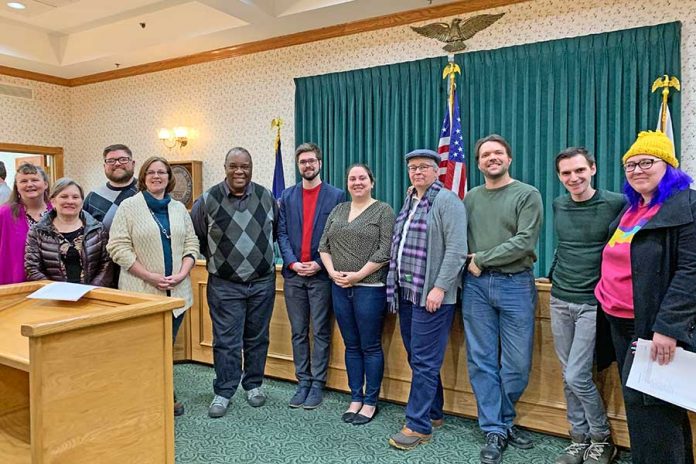
On Dec. 17, the Huntingdon Borough Council voted to adopt an LGBT-inclusive nondiscrimination ordinance, making the borough the first rural community and 58th municipality in Pennsylvania to enact local protections for LGBT people in employment, housing and public accommodations.
Home to Juniata Collage, Huntingdon is about 30 miles south of the geographic center of Pennsylvania and has almost 7,000 residents.
The vote was 4-3 at the evening meeting. Council President Nicole Houck, Council Vice-President Sean Steeg, and Councilmembers Robert Jackson and Johnathan Hyde voted in favor, while Councilmembers David Quarry, James Bair and Terry Green voted in opposition.
Houck told PGN, “I think this is a huge victory for the borough of Huntingdon. We’ve made a statement that we care about the people in our community, and we want this to be a safe place. It’s especially amazing to be the first rural township pass such an ordinance. It feels good to be making history in such a positive way in our little town.”
Huntingdon resident Anthony Bullett began advocating for the ordinance nine years ago. In 2015, he contacted the Pennsylvania Youth Congress for support, and PYC has been involved ever since. Bullett, along with Pat Hunter and other community members, formed Diversity Huntingdon to coordinate education and advocacy over several years with Borough Councilmembers.
“It’s not just what we have done over the past few years, but even looking back 50 years ago, what my father and others tried to do in this town. That we have finally been able to get inclusive nondiscrimination protections into law is tremendous. There will not be another generation that has to live under legal discrimination, at least not in our community of Huntingdon,” Bullett said, celebrating the victory.
Hunter, whose son is a part of the LGBT community added, “I am very excited, beyond words. I would not have thought that 22 months ago this ordinance would have passed. We came a long way, and we turned a lot of people’s opinions in the right direction.”
She said when her son was the one who informed her that there were no nondiscrimination protections for him in Huntingdon when he was in only the ninth grade. He told his mother he would not stay in the borough after graduation, and he didn’t.
“Now, maybe it opens the door for individuals who are interested in staying to know they are welcome and protected here,” Hunter said.
Executive Director of the Pennsylvania Youth Congress Jason Landau Goodman said in a release, “We could not be prouder of the local leaders who advocated consistently over the years to this moment. We have been honored to support them from day one in this effort, and join them in directly advocating with Huntingdon Borough Council to approve this urgently-needed ordinance.” He added, “Huntingdon joins other communities in sending the lightning rod to Harrisburg to pass LGBT nondiscrimination protections and paves the way for additional ordinances in rural Pennsylvania communities to be adopted.”
The Pennsylvania Youth Congress has worked with local leaders in several rural mid-state communities to adopt nondiscrimination ordinances. Borough Councils in Gettysburg and Shippensburg are committed to advanced conversations about nondiscrimination ordinances in 2020.
Pennsylvania is the only state in the Northeast that does not have statewide LGBT nondiscrimination protections, but the Keystone State does have the most local LGBT nondiscrimination ordinances. Philadelphia passed a nondiscrimination ordinance for sexual orientation in 1982, with an amendment in 2002 to extend protections to gender identity.
The Pennsylvania Youth Congress developed a public support campaign called Pennsylvania Values gathering support from businesses, chambers of commerce, colleges, nonprofits and faith leaders.
State Senator Pat Browne (R-16) introduced the first LGBT nondiscrimination bill this legislative session, SB 224, where it remains in the Senate Labor and Industry Committee for review. Sen. Larry Farnese (D-1) introduced SB 614 and Rep. Dan Frankel (D-23) introduced HB 1404, which remain in the Senate Labor and Industry Committee and House State Government Committee respectively.